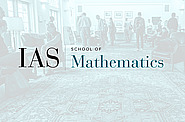2006-2007 seminars
Nov
07
2006
Computer Science/Discrete Mathematics Seminar II
Solvability of Polynomial Equations over Finite Fields
10:30am|S-101
Nov
06
2006
Computer Science/Discrete Mathematics Seminar I
Towards Harmful Low-Rate Noise Models for Quantum Computers
11:15am|S-101
Oct
31
2006
Computer Science/Discrete Mathematics Seminar II
2-Source Dispersers for Sub-Polynomial Min-Entropy and Ramsey Graphs Beating the Frankl Wilson Construction
10:30am|S-101
Oct
30
2006
Computer Science/Discrete Mathematics Seminar I
2-Source Dispersers for n^{o(1)} Entropy, and Ramsey Graphs Beating theFrankl-Wilson Construction
11:15am|S-101
Oct
17
2006
Oct
16
2006
Computer Science/Discrete Mathematics Seminar I
Randomness-Efficient Sampling Within NC^1
Alex Healy
11:15am|S-101
Oct
10
2006
Computer Science/Discrete Mathematics Seminar II
An Invitation to Combinatorial Games
10:30am|West Building Lecture Theatre
